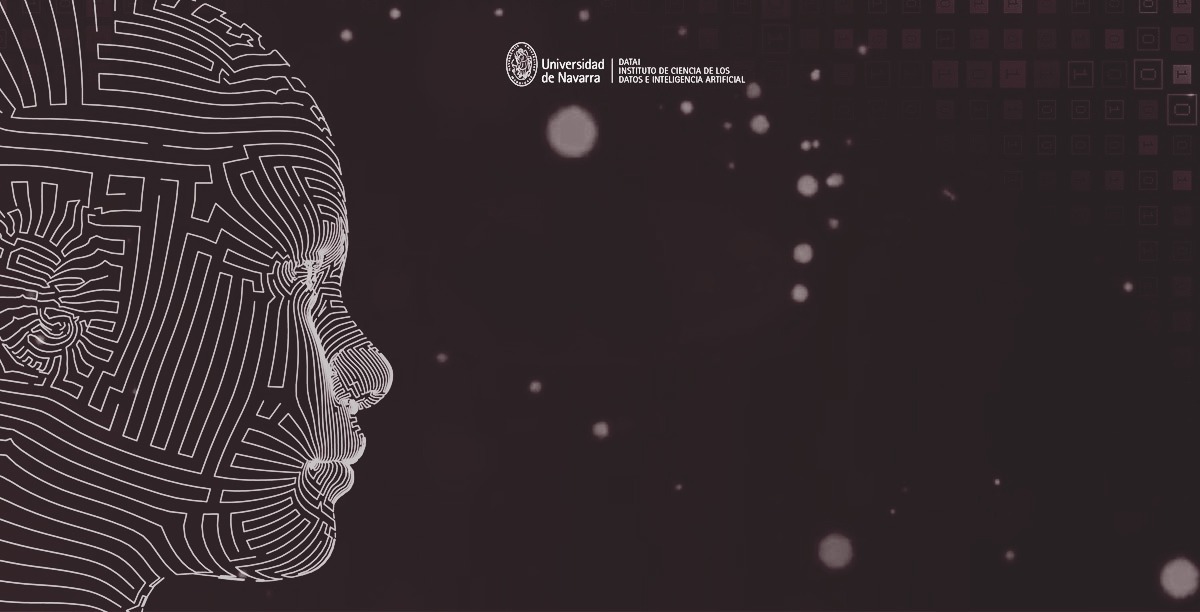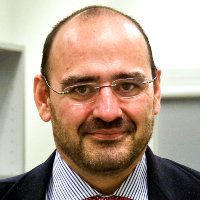The Institute for Data Science and Artificial Intelligence (DATAI) announces the DATAI Awards 2024-2025 for particularly relevant scientific contributions in the field of Data Science and Artificial Intelligence. The prizes recognize originality, innovation and contribution with the double objective of encouraging research work in this field as well as its projection to society.
DOWNLOADS
A maximum of two prizes will be awarded in this call, each with an endowment of 3,000 euros as aid for the development of a research project. The award-winning contributions must be pioneering and influential in international research. If the prize is awarded to an application submitted by two or more members of the institute, one of them will act as the person responsible for the aid.
The awards are aimed at DATAI member researchers, in any of its modalities, affiliated, associated or invited members. The contribution will mention DATAI among the authors' affiliations, not being enough a mention in the acknowledgments.
The winners will give a seminar on the winning articles.
All the necessary documentation related to the awards will be sent in digital format to datai@unav.es from December 20, 2024 until August 31, 2025. We have extended the deadline to September 8, 2025.
The awards will be announced by October 30, 2025.
SCIENTIFIC COMMITTEE MEMBERS:
-
Amparo Alonso Betanzos - Universidade da Coruña
-
Enrique del Castillo - The Pennsylvania State University
-
John Stufken - George Mason University
PREMIO 2024-2025
AWARD
Methodological contribution
ALBERTO GARCÍA GALINDO
Contribution: Fair prediction sets through multi-objective hyperparameter optimization
Author(s): Alberto García-Galindo, Marcos López-De-Castro & Rubén Armañanzas
Brief description of the qualities motivating the award: Novel approach to the use of shaped prediction and multi-objective optimization techniques to adjust hyperparameters in order to balance efficiency and fairness. A well-written article, reproducible in code and data, with rigorous experimentation. The novelty lies in how the tools are used, not in their development.
PREMIO COMPARTIDO
AWARD
Applied contribution
MIKEL HERNÁEZ
Contribution: Towards a more inductive world for drug repurposing approaches
Author(s): Jesus de la Fuente, Guillermo Serrano, Uxía Veleiro, Mikel Casals, Laura Vera, Marija Pizurica, Nuria Gómez-Cebrián, Leonor Puchades-Carrasco, Antonio Pineda-Lucena, Idoia Ochoa, Silve Vicent, Olivier Gevaert & Mikel Hernaez
Brief description of the qualities motivating the award: The authors propose moving from a deductive approach to an inductive paradigm that exploits representations learned in ML to discover new drug-target interaction (DTI) connections. They also propose the use of “negative edge subsampling” for in silico validation, which allows interactions that previously went unnoticed to be detected. Good conceptual idea, publication in a Q1 journal on AI, with an IF of 23.9 and already 7 citations despite its recent publication in 2025.
AWARD
Applied contribution
MATÍAS ÁVILA CLEMENTE
Contribution: Modelling time series with multiple seasonalities: an application to hourly NO2 pollution levels
Author(s): M. L. Avila, A. M. Alonso & D. Peña
Brief description of the qualities motivating the award: This is a study on time series with multiple seasonalities. It examines 15 years of pollution data in Madrid. It is a good application article with potential impact, easy to read, exhaustive experimentation and results that can be exported to other applications.
AWARD
Methodological contribution
IDOIA OCHOA
Contribution: GENNIUS: an ultrafast drug–target interaction inference method based on graph neural networks
Author(s): Uxía Veleiro, Jesús de la Fuente, Guillermo Serrano, Marija Pizurica, Mikel Casals, Antonio Pineda-Lucena, Silve Vicent, Idoia Ochoa, Olivier Gevaert, Mikel Hernáez
Brief description of the qualities motivating the award: Major methodological contribution to a data science problem, offering an efficient solution with significant social and economic implications.
PREMIO COMPARTIDO
AWARD
Applied contribution
IGNACIO RODRÍGUEZ CARREÑO
Contribution: AI perceives like a local: predicting citizen deprivation perception using satellite imagery
Author(s): Angela Abascal, Sabine Vanhuysse, Taïs Grippa, Ignacio Rodriguez-Carreño, Stefanos Georganos, Jiong Wang, Monika Kuffer, Pablo Martinez-Diez, Mar Santamaria-Varas & Eleonore Wolff
Brief description of the qualities motivating the award: Deep understanding of technological advancements in the field, contributing to innovation in predicting social phenomena through urban image analysis.
AWARD
Applied contribution
RUBÉN ARMAÑANZAS ARNEDILLO
Contribution: Identification of concussion subtypes based on intrinsic brain activity. JAMA Netw Open
Author(s): Armañanzas R, Liang B, Kanakia S, Bazarian JJ, Prichep LS.
Brief description of the qualities motivating the award: Thoroug statistical analysis of EEG data aimed at classifying potential subtypes of concussions, a contribution that could aid future diagnosis in brain activity detection.
AWARD
Applied contribution
LUIS A. GIL ALAÑA
Contribution: Compendium of 4 contributions:
1. Persistence in UK Historical Data on Life Expectancy.
2. Long Memory Cointegration in the Analysis of Maximum, Minimum and Range Temperatures in Africa: Implications for Climate Change.
3. Measuring Persistence in the US Equity Gender Diversity Index.
4. Energy prices in Europe. Evidence of persistence across market.
Author(s): Guglielmo Maria Caporale, Juan Infante, Marta del Rio, Olaoluwa S. Yaya, Oluwaseun A. Adesina, Hammed A. Olayinka, Oluseyi E. Ogunsola, Miguel A. Martin-Valmayor, Luis A. Gil-Alana
Brief description of the qualities motivating the award: This is a compilation of four articles that address fractional integration and cointegration along with their empirical implementations. The first of these articles examines the historical evolution of life expectancy in the United Kingdom. The second article focuses on climate change in Africa and once again uses techniques of fractional integration and cointegration. The third article investigates gender diversity equity in the United States. Finally, the fourth article centers on the study of energy prices in Europe.
AWARD
Methodological contribution
ÁNGEL RUBIO
Contribution: Precision oncology: a review to assess interpretability in several explainable methods.
Author(s): Marian Gimeno, Katyna Sada del Real, Angel Rubio.
Brief description of the qualities motivating the award: In this paper, a novel algorithm called "Optimal Decision Trees" was introduced, whose goal is precisely to solve the PM problem. It is based on trees. In each bifurcation of the tree, the algorithm identifies the best marker (discrete or continuous) and the optimal drugs for the patients in each branch of the tree. Since the algorithm is very fast, it can be transformed into a random optimizing forest or an extreme gradient boost method. Another advantage is the simplicity of the method: the trees are self-explanatory and easy to understand.
AWARD
Applied contribution with an impact in the social sphere, innovation or knowledge transfer
MIGUEL VALENCIA USTARROZ
Contribution: An interactive framework for the detection of ictal and interictal activities: Cross-species and stand-alone implementation.
Author(s): Guillermo M. Besné, Alejandro Horrillo-Maysonnial, María Jesús Nicolás, Ferran Capell-Pascual, Elena Urrestarazu, Julio Artieda, Miguel Valencia
Brief description of the qualities motivating the award: This work uses canned Matlab ML functions to implement 6 different ML methods for the detection of events from EEG data. The authors analyze the signals both in the time and frequency domain. It is an interdisciplinary work, which gives it an added value. They build customized ML models for the detection of ictal and interictal activities for the automatic annotation of epileptic traits based on electrophysiological recordings. It appears to require considerable input from the user, although the claim is made that the interactive app is simpler than available methods.
AWARD
Methodological contribution
FRANCISCO PLANES PEDREÑO
Contribution: BOSO: A novel feature selection algorithm for linear regression with high-dimensional data.
Author(s): Luis V. Valcárcel, Edurne San José-Enériz, Xabier Cendoya, Ángel Rubio, Xabier Agirre, Felipe Prósper, Francisco J. Planes
Brief description of the qualities motivating the award: The paper presents a new method for feature selection in high dimensional regression, and empirically demonstrates based on synthetic datasets how it works better than Lasso, forward selection, best subsets, and the relaxed lasso methods. It performs very well for data that can be modeled by a linear regression model. The broad applicability makes this an appealing work.









